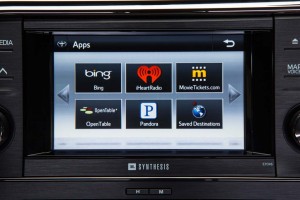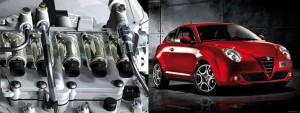You tap a button on the steering wheel, wait for the beep and read out the address you’re looking for in a suburb of Detroit. After a seemingly interminable wait, the car’s voice-controlled navigation system responds – directing you to a location in Delaware.
Wonky navigation systems, especially those using voice control, are the single biggest complaint motorists have about their 2016 cars, according to the latest J.D. Power Initial Quality Study, with problems involving high-tech systems, in general, accounting for a full 24% of the “problems” reported in the new study.
But while traditional complaints such as faulty engines and loose exterior trim, have declined sharply in recent years, mechanical defects haven’t vanished entirely. If anything, consumers are growing frustrated by the latest generation of 8- and 9-speed transmissions, according to Renee Stephens, the chief automotive analyst with J.D. Power and Associates.
On the whole, 2016 is proving to be a watershed year for automakers and auto buyers. The quality of the latest cars, trucks and crossovers is at record levels, the overall number of complaints declining 6% since last year’s Initial Quality Study was released. The study delivered some surprising findings, including the fact that non-premium brands actually out-performed luxury marques – and that Kia had the highest-quality of any of the 33 brands included in the study.
(Who were the winners and losers in the 2016 J.D. Power Initial Quality Study? Click Here to find out.)
But beyond the immediate headlines, the 2016 IQS reveals a lot about both the improvements made by, as well as the struggles still facing, the automotive industry.
Power restructured the Initial Quality Study in three years ago to take into account all the new technologies that are being added to the latest automobiles, everything from infotainment systems to the advanced driver assistance systems that are a precursor to tomorrow’s autonomous vehicles.
Since then, it’s become obvious that while consumers say they want the latest and greatest tech features, they’re frustrated by that very same technology.
Navigation and voice control technology – especially when it comes to voice-controlled navi systems – are the single biggest source of frustration. Consumers complain about slow response times and inaccurate voice recognition, in particular.
“It’s critical these technologies are implemented correctly or consumers lose their trust,” explained Stephens.
In many instances, consumers simply don’t know about all the technology on their vehicles or haven’t gotten clear instructions on how to use all the new systems. And according to Power research, said Stephens, “If consumers don’t engage a feature in the first 30 days, chances are they won’t ever use it at all.”
Some manufacturers are developing methods to resolve such problems – and, in the process, drive up their IQS scores. BMW, for example, automatically schedules a follow-up appointment when a customer buys a new, tech-laden 7-Series sedan. A dealer representative will meet the new owner at the showroom, or their home or office, to make sure there are no problems.
When Power launched the Initial Quality Study 30 years ago, there weren’t many electronic systems onboard beyond the stereo. Anti-lock brakes hadn’t even been introduced yet. So, thinks like loose trim, wind noise and faulty powertrains made up the majority of the complaints customers reported.
Today, parts rarely fall off. Rust is rare. And engines almost never fail, even after 100,000 miles. But the 2016 IQS shows that mechanical issues haven’t vanished entirely.
There was a slight increase in wind noise issues this past year. Exactly why is uncertain. It may reflect the ongoing shift from passenger cars to SUVs and other light trucks. By nature, with their less efficient aerodynamics, they’re likely to be noisier than more streamlined sedans and coupes.
The surprise was the rise in complaints about transmissions. There have been a few spikes in recent years. Ford was hammered over the clunky dual-clutch gearbox used in several small cars, such as the Focus. But now, transmissions seem to be giving everyone a headache.
Actually, it’s not as much of a surprise when you realize that another big industry trend – meant to reduce fuel consumption to meet tough new mileage mandates – has automakers switching from traditional, four-, five- and six-speed gearboxes to a new generation of eight- and nine-speed automatic transmissions. Toyota, General Motors and Ford are getting ready to launch 10-speeds.
The higher the number of gears, it seems, “the higher the number of complaints,” said Power’s Stephens. In fact, with many automakers finally beginning to solve some of their problems with digital infotainment technologies, transmissions are seeing “the biggest growth in the number of complaints.”
(Could a faulty electronic shifter have led to death of Star Trek star? Click Here for that breaking story.)
While gearboxes rarely fail, the issue is that these new gearboxes often prove balky. They may stay in the wrong gear, or they may bounce from gear to gear to gear trying to find the most efficient ratio. In fact, this is a high-tech issue, as well, the problem largely one involving the software used to program these advanced transmissions.
Whatever the issue Power research shows consumers are growing increasingly intolerant of quality issues. Among those who have no problems to report, nearly six in ten will likely buy from the same brand when it’s time to trade in. On the other hand, nearly six in ten of the owners who report three or more problems will switch brands. It’s no wonder automakers pay close attention when the latest IQS results are released each June.
(JD Power isn’t the only one looking at quality and customer satisfaction. To check out the new Strategic Vision Total Quality study, Click Here.)



Problems and progress are longtime, passionate lovers.